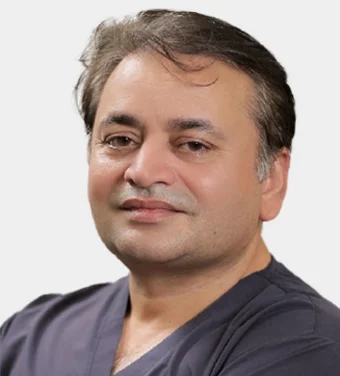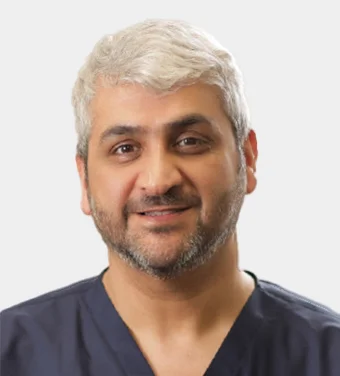
Experience exceptional care at IBS Hospital for intricate skull-based or cranial-based surgeries. Our specialized team employs cutting-edge techniques to ensure precise interventions, addressing complex conditions while prioritizing patient well-being. Trust us for comprehensive expertise and compassionate support throughout your healing journey.
What is Skull-Based or Cranial-Based Surgery?
Skull-based surgery, also referred to as cranial-based surgery, is a type of surgical intervention performed to address and treat conditions affecting the base of the skull—the area beneath the brain from which vital nerves and blood vessels exit. Skull-based surgeries are generally complex and require immense expertise due to the difficult-to-reach nature of this area,characterized by its complex anatomy.
IBS Hospital has a well-established history as a leader in minimally invasive treatment for a wide range of skull base tumors and lesions. Our team pioneered surgical techniques for reconstructing arteries at the base of the brain and microvascular free tissue transfer. We continue to uphold this tradition of leadership and excellence by utilizing advanced methods such as transoral robotic surgery (TORS), 3-D navigation planning, intraoperative neurophysiological monitoring (IONM), surgical simulation, and cutting-edge research to provide patients with the safest and highest quality care possible.
What are the types of Skull-Based or Cranial-Based Surgeries performed at IBS Hospital?
There are several different types of Skull-Based Surgeries, including:
Minimally Invasive Eendoscopic Surgery: This surgery utilizes an endoscope and is performed through the sinus cavity. It is commonly recommended for the minimally invasive removal of skull-based tumors, reducing the need for brain manipulation and minimizing damage to surrounding structures.
Open Skull Surgery: This surgery is performed through a conventional approach, involving a single large incision and the removal of a bone flap from the skull. It allows doctors to access and remove the tumor.
Advanced Microscopic and Laser Surgeries: This highly innovative technique is best suited for removing tumors deep within the skull base. Such surgeries offer increased precision and accuracy, enabling doctors to safely target and destroy tumors.
Radiosurgery: This surgical intervention uses ionizing radiation to destroy tumors with enhanced accuracy. The radiation dose can be controlled and adjusted to meet the specific requirements of the patient.
Gamma knife: An advanced modality used in radiosurgery, the gamma knife allows doctors to treat complex skull-based conditions without the need for surgical incisions.
What are the conditions in which a Skull-Based Surgery is recommended?
Skull-Based Surgery may be recommended for the following reasons:
- To remove congenital cysts present in the skull base.
- To remove abnormal masses or growths acquired later in life.
- To treat tumors of the pituitary gland.
- To remove and treat meningiomas
What are the symptoms in which your doctor will recommend a Skull-Based Surgery?
Skull-based surgery is recommended for individuals experiencing problems related to the skull base area.
Common symptoms associated with these issues include:
- Unexplained facial pain
- Frequent headaches
- Increased susceptibility to sinus infections
- Dizziness
- Vision and hearing problems
- Numbness in specific areas of the body, especially the limbs”
Treatment
Before the Surgery:
- A series of tests will be performed to thoroughly assess the problem and determine the best course of treatment. Common diagnostic modalities used to examine the skull base include brain imaging (such as MRI and CT), blood analysis, and biopsy.
- Following this, available treatment options will be discussed with the patient.
- A personalized approach will be followed based on your specific requirements.
On the Day of the Surgery:
- You will arrive at the hospital and complete the check-in process.
- Your surgical team and staff will introduce themselves.
- You will be assigned a nurse who will escort you to the operating theatre.
Recuperation in the Hospital:
- Post-operative critical care and observation are crucial during your hospital stay.
- Patients are typically discharged within a day or two.
- Close monitoring and assessment by your assigned caregivers will continue.
- Physiotherapy and rehabilitative care will be provided to expedite your recovery.
- A discharge plan, containing essential information about your medication and rehabilitation, will be prepared and provided to you.
Recuperation at Home:
- You will receive instructions on wound care.
- You will be provided with guidelines regarding medication, diet, and daily activity limits.
- Scheduled follow-ups will be arranged to assess your recovery.
Follow-Up Care:
- Maintain regular contact with your doctor to ensure a smooth and speedy recovery.
- Regular follow-up appointments are an integral part of our treatment model to ensure that you and your doctor are aligned in your recovery plan.
Our team of experts that make it possible
Meet the team of highly specialised and experienced neurosurgeons, neurologists, orthopedicians, and other experts in the field of neurology and spine care. Our team is dedicated to providing personalised and compassionate care to each patient, with the goal of helping them achieve the best possible outcomes.

Dr. Vikas Gupta
Senior Neurosurgeon

Dr. Dewaker Sharma
Senior Neurosurgeon

Dr. Sachin Kandhari
Senior Neurosurgeon

Dr. Anup Gogoi
Senior Neurosurgeon

Dr. Ankur Dhandha
Anaesthetist

Dr. Gaurav Sharma
Senior Sports Physiotherapist

Dr. Sachin Samuel
Senior Neuro Physiotherapist

Dr Ankush Arora
Anaesthetist

Dr Amarjyoti Yadav
Anaesthetist
IBS Hospital Empowers Your Treatment with Cutting-edge Technology
We continuously incorporate cutting-edge technologies from around the world into our offerings, such as a surgical system that allows for precise and confident complex procedures. We use magnetic stimulation to treat certain neurological conditions and create personalised brain maps for tailored treatment plans. Nerve monitoring during surgeries ensures the nervous system is not compromised, and a robotic exoskeleton aids in mobility issues. Our goal at IBS Hospital is to provide the best care possible, utilising the latest and most innovative technologies available.


